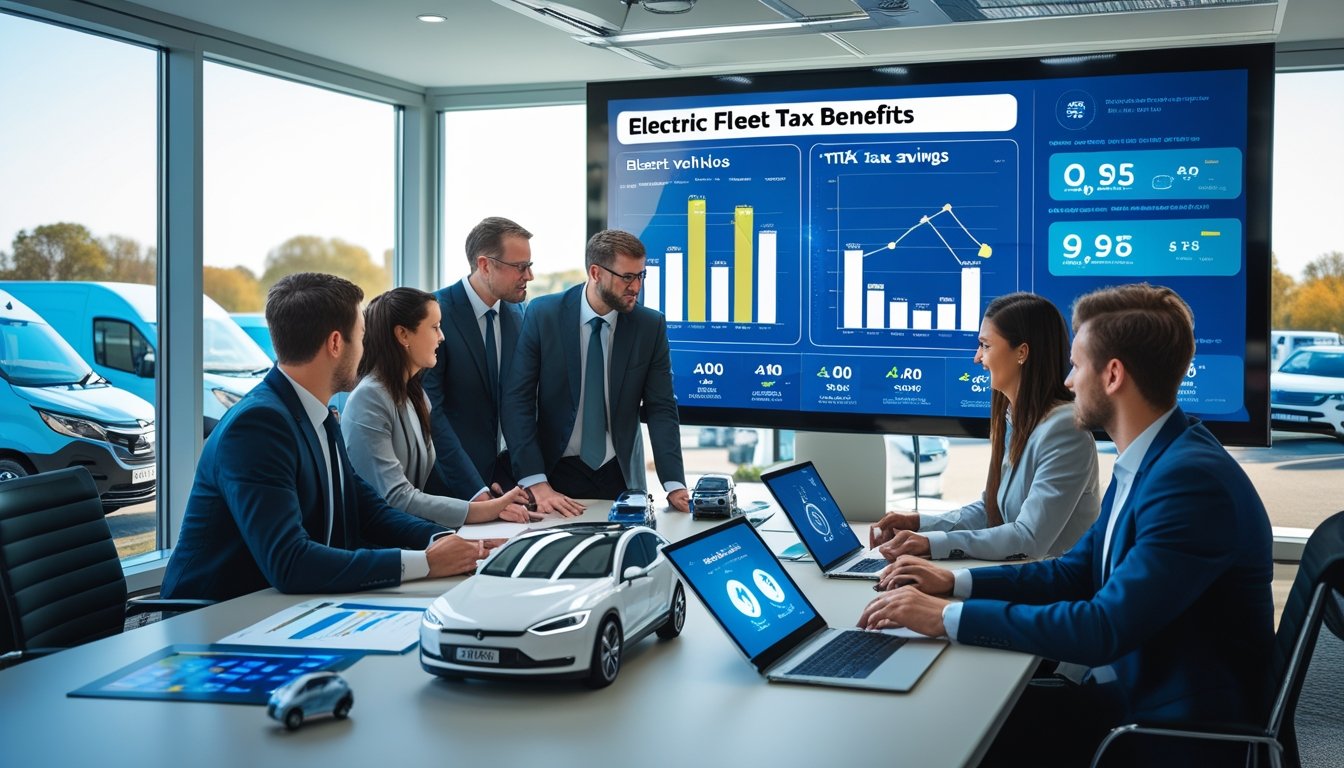Late updated: 05 Jul 2025 14:07
Written by: Amber Collins
Exploring Electric Fleet Tax Benefits for UK Businesses: Maximising Financial Efficiency
Navigating the landscape of electric vehicle tax benefits in the UK offers significant incentives for businesses eager to enhance their sustainability strategy. By adopting electric fleets, businesses not only contribute to a greener environment but also benefit substantially from financial relief. The low benefit-in-kind (BIK) tax rates and generous grants available for electric vehicles can lead to sizeable savings.

The government-backed incentives make electric vehicles an attractive option for both small enterprises and large fleet managers. For businesses choosing to lease electric vehicles, there are options to offset costs against pre-tax profits, turning a potential financial burden into a savvy financial strategy. This transition is aligned with broader environmental goals, showcasing corporate responsibility while reaping operational savings.
Understanding the tax regime for electric vehicles empowers businesses to make informed decisions that weigh up both economic benefits and sustainability considerations. Transitioning to electric fleets can reduce running costs and provide a competitive edge in the market.
Key Takeaways
- Electric fleets offer significant tax benefits for UK businesses.
- Financial incentives and grants ease the transition to electric vehicles.
- Adopting electric fleets supports sustainability and reduces costs.
Key Electric Fleet Tax Benefits for UK Businesses

Electric vehicles (EVs) offer numerous financial advantages to businesses in the UK through tax benefits and incentives. By incorporating EVs into company fleets, businesses can take advantage of reduced taxation, government grants, and other financial incentives.
Company Car Tax Savings and Benefits in Kind
Benefit-in-Kind (BiK) Advantages: Electric company cars enjoy significantly lower BiK tax rates compared to petrol or diesel vehicles. This low BiK rate serves as a strong motivator for companies aiming to reduce operational costs.
CO2 Emissions Impact: The taxation for company cars is directly affected by their CO2 emissions. EVs, with zero emissions, lead to reduced tax liabilities. Our clients often witness substantial savings when switching to electric fleet vehicles.
HMRC Guidelines: HM Revenue and Customs (HMRC) offers favourable guidelines for electric vehicles, reflecting a commitment to promoting environmentally friendly business practices through reduced tax burdens.
Capital Allowances and Corporation Tax Relief
Capital Allowances: Businesses can claim 100% first-year capital allowances on electric vehicles. This allows the cost of EVs to be deducted from profits before tax, enhancing cash flow management.
Corporation Tax Relief: Starting from April 2023, the corporation tax rate increased, making tax relief on EVs even more attractive. By offsetting the cost of EVs against profits, businesses reduce their overall tax payable.
Investment Incentives: Encouragement from the government, seen in these allowances, promotes the transition to sustainable transport solutions. Companies that adopt EVs benefit not just ecologically but economically, gaining a competitive edge.
Grants, Incentives, and Workplace Charging Scheme
Government Grants: Although the Plug-in Car Grant has ceased for most vehicles, substantial discounts for electric vans were available, notably £2,500 to £5,000 depending on vehicle size.
Workplace Charging Scheme: This scheme supports businesses in installing charging points, covering up to 75% of installation costs. This initiative is instrumental in fostering convenient access to charging infrastructure for employees.
Tax Incentives and Implementation: Alongside the grants, businesses can enjoy tax incentives for workplace charging investments, incentivising the use of electric fleets. This is crucial for reducing operating costs and promoting sustainability within company operations.
Operational, Financial, and Environmental Advantages of Electric Fleets
Investing in an electric fleet offers numerous benefits across operational efficiency, cost management, and environmental impact. The transition involves careful planning and a strategic understanding of compliance, but the potential for reduced operating costs and improved sustainability is substantial.
Reducing Running and Maintenance Costs
Electric vehicles (EVs) are known for their efficiency in day-to-day operations. Reduced fuel expenses present a large portion of the financial advantage. Unlike traditional vehicles that rely on petrol or diesel, EVs use electricity, which is often cheaper and allows for more predictable expenditure.
Maintenance costs are generally lower as well. Electric engines have fewer moving parts than their internal combustion counterparts, resulting in reduced wear and tear. This can lead to significant savings on servicing and repairs, making EV fleets a financially attractive option for businesses.
Improved ESG Performance and Environmental Impact
Incorporating an electric fleet enhances a company's ESG (Environmental, Social, and Governance) performance. A key environmental benefit is the reduction in CO2 emissions. Electric vehicles produce zero tailpipe emissions, helping businesses meet sustainability targets and improve their corporate image.
From a social perspective, cleaner air and reduced noise pollution contribute to better living conditions in urban areas. This aligns with broader societal goals of sustainability and environmental responsibility, which can boost a company's standing among customers and investors alike.
Planning, Compliance, and Future Considerations
Planning and compliance are crucial aspects of transitioning to an electric fleet. We must consider infrastructure needs, such as installing charging stations at strategic locations. Staying compliant with HMRC regulations and policies is essential, as the UK government continues to push for vehicle electrification.
Future considerations include keeping abreast of evolving environmental regulations and technological advancements. As the electric vehicle landscape expands, so do the options and incentives available, such as reduced taxes and grants. Aligning these factors with our strategic planning ensures sustained benefits from our electric fleet.
Frequently Asked Questions

In the UK, businesses have several tax incentives to consider when adding electric vehicles (EVs) to their fleets. We'll explore the various aspects related to corporation tax reliefs, benefit in kind tax, sole trader considerations, projected future tax rates, incentives for transitioning fleets, and employee-related tax implications.
What corporation tax reliefs are available for UK businesses purchasing electric vehicles?
UK businesses can claim a 100% First Year Allowance on electric vehicles. This allows them to deduct the full cost of the vehicle from their profits before tax is calculated. Such an allowance significantly reduces corporation tax liability, a clear benefit compared to the limited deduction available with petrol or diesel vehicles.
How does acquiring an electric vehicle impact benefit in kind tax for UK company directors?
Electric vehicles offered as company cars typically come with a lower Benefit-in-Kind (BiK) tax rate. This reduced BiK rate makes electric cars an attractive option for company directors, resulting in decreased personal tax liabilities compared to traditional fuel vehicles. By choosing EVs, company directors can benefit financially from these lower taxation rates.
Can a sole trader in the UK claim tax benefits when leasing an electric vehicle for business use?
Yes, sole traders can also take advantage of tax benefits when leasing electric vehicles. They can offset the leasing costs against their profits, thereby reducing their taxable income. The specific allowances and deductions applicable may vary, so it's advisable for sole traders to consult with a tax professional to maximise benefits.
What are the projected company car tax rates for electric vehicles in the UK by 2025?
By 2025, electric vehicles are expected to maintain favourable company car tax rates in the UK. Although rates are subject to change, the government aims to continue promoting electric vehicle adoption through competitive tax policies. Monitoring updates from HMRC ensures businesses remain informed of any adjustments in tax legislation.
How does the UK government incentivise businesses to transition to an electric fleet?
The UK government encourages businesses to adopt electric fleets through various tax incentives, including Enhanced Capital Allowances and reduced BiK rates. Additional support comes in the form of grants and subsidies for installing EV charge points at workplaces. Together, these measures aim to ease the transition and make electric vehicles a financially sound choice for businesses.
What are the tax implications for a limited company offering electric vehicles to employees?
When a limited company provides electric vehicles to employees, it's crucial to consider both employer and employee taxation. Companies may benefit from lower National Insurance contributions due to the reduced BiK rates of electric vehicles. At the same time, employees benefit from lower income tax obligations, enhancing the attractiveness of electric company cars.
